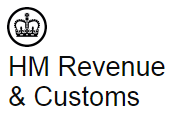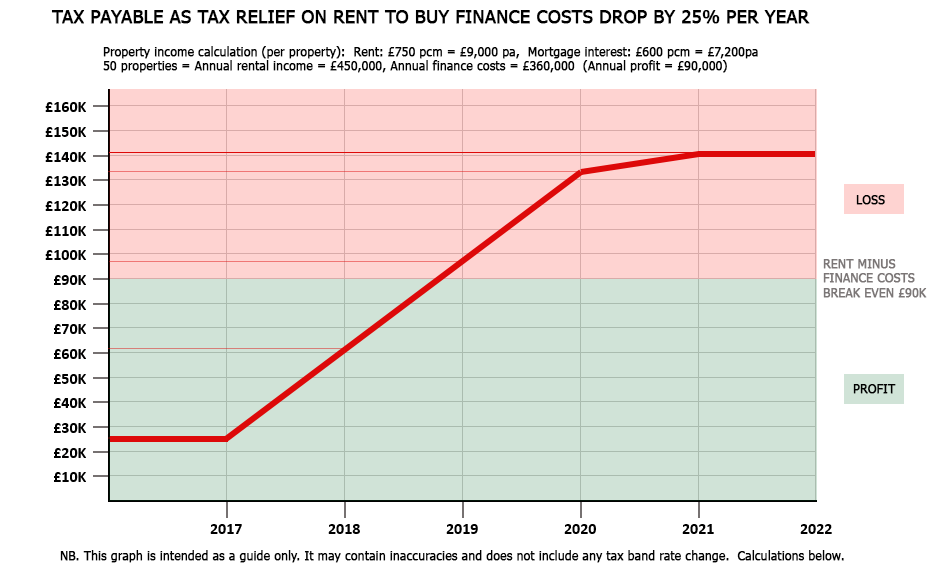Section 24 Means Buy To Let Landlords Can No Longer Offset 100% of Mortgage Interest Against Rental Income.
 Section 24 is a HMRC taxation change affecting what costs can be deducted from rental income to calculate ‘Net Profit’ – i.e. the figure counted as income and the figure that you will pay taxed against.
Section 24 is a HMRC taxation change affecting what costs can be deducted from rental income to calculate ‘Net Profit’ – i.e. the figure counted as income and the figure that you will pay taxed against.
As tax relief drops and tax bills rise, in some cases* the annual sum of mortgage repayments and taxes will be more than rental income minus costs. Some landlords will need to sell at least part of their portfolio to avoid making SIGNIFICANT annual losses.
Chris Cooper of Axe The Tenant Tax said,
“A perfect storm is brewing in the rental market, landlords will either have to raise rents or sell because of the tax rises. Landlords are sleepwalking into disaster”.
According to Landlord Referencing UK, circa. 1.4 million landlords are unaware of the drastic effect it is going to have on their rental income and their tenancies over the next 4 years while RightMove research indicates 24% of landlords are already planning to sell at least one or more properties from their current portfolio in response to the new regulations and tax changes.
* See below for examples.

In A Nutshell

The tax relief that private landlords of residential properties will be able to claim for finance costs is being restricted to the basic rate of Income Tax (20%) for the lowest amount between finance costs, property business profits or adjusted total income.
Until April 2017 mortgage interest was an allowable expense so ‘Net Profit’ represented rental income minus mortgage interest and any other allowable expense.
After 2021, Net Profit will be calculated on rental income minus allowable expenses but NOT including mortgage interest.
The changes are being phased in over a four year period with the amount of finance that can offset income being reduced from 100% to 0% in 25% steps.
|
2016 /17 – 100% TAX RELIEF 100% of 360,000 = £360,000 Taxable income, (450,000 – 360,000) = £90,000 Income Tax calculation: Total Income Tax = £25,200 Rent: £450,000 |
2017/18 – 75% TAX RELIEF 75% of 360,000 = £270,000 Taxable income, (450,000 – 270,000) = £180,000 Income Tax calculation: Total Income Tax = £61,200 Rent: £450,000
|
2018/19 – 50% TAX RELIEF 50% of 360,000 = £180,000 Taxable income, (450,000 – 180,000) = £270,000 Income Tax calculation: Total Income Tax = £97,200 Rent: £450,000 |
|
2019/20 – 25% TAX RELIEF 25% of 360,000 = £90,000 Taxable income, (450,000 – 90,000) = £360,000 Income Tax calculation: Total Income Tax = £133,200 Rent: £450,000
|
2021 onward – 20% TAX RELIEF 20% of 360,000 = £72,000 Taxable income, (450,000 – 72,000) = £378,000 Income Tax calculation: Total Income Tax = £140,400 Rent: £450,000
|
These calculations (together with the others on our case studies page) are intended as approximate illustrations only and may contain minor inaccuracies. We strongly recommend anyone concerned about the effect of Section 24 on their tax bills should discuss the implications with their accountant and get a detailed, tailored projection tailored to their own portfolio.
We specialise in selling tenanted property with minimum disruption to rental income and solving tenant and/or lease related problems quickly to minimise the cost and time spent running an empty property.
We do not offer advice on tax or allowable expenses and we cannot assist with any tax related calculation or projection however we can provide an estimated schedule and selling price for any rental property(ies) you want to sell as well as answering any questions you might have in relation to the sales of the property – e.g. how we will manage the sale if you want to sell with tenants or how we can arrange vacant possession).
For the government guidance on working out the effect of Section 24 tax relief abolition, see How to assess the impact of Section 24 from 6 April 2017.
Sam Jackson, UK Director of The National Landlord Code of Excellence Limited had this to say to housing minister Gavin Barwell recently at a buy-to-let forum,
“I’ve been a landlord for 12 years I had bought poor housing and renovated it. I had bought poor housing and renovated it I homed 55 people in 34 units, I had not raised rents in many years. I told him in four years he [Chancellor George Osborne] will make me bankrupt.”
See UK Director of NLSE message to Housing Minister Gavin Barwell
The most consistent advice given to landlords and property investors by the HRMC and advisory bodies is make sure you keep informed and be prepared for the effects of Section 24 so you can make informed decisions and plans ahead of tax payment deadlines.
National Residential consultants are experts in property investment opportunities and property sales.
Contact us today on 0800 612 8659 to find out how we can help landlords and property investors sell rental property with minimum disruption to rental income and/or re-invest in other property ventures before the next phase of Section 24 tax changes increases tax bills even more.
What Can Landlords Do To Avoid Operating At A Loss
The worst affected by Section 24 will be the Buy To Landlords with the highest overall finance costs, especially landlords with finance loans on multiple properties. As a rule of thumb, the higher the finance costs, the more the effects will be felt. Landlords with smaller portfolios may still operate at a profit.
Landlords who find themselves operating at a loss may want:
- Option 1: To offset the tax rises, some landlords may hope to raise rents and pass the costs on to tenants however tenants can challenge unfair or unrealistic rent rises (see Government Advice on Private Renting ) and landlords without finance costs who do not increase rents will be far more attractive to renters so that buy to let landlords who do increase their rents risk poor tenant retention and possible prolonged bouts of empty properties.
- Option 2: An alternative option is to incorporate by transferring your property portfolio to a new company registered in your name however the transfers will be considered as a sale from the HRMC point of view and each sale will be liable to land tax and a higher rate of capital gains tax. There are also other implications such as the possibility of higher rates for business mortgages and other taxes including stamp duty to pay on the purchase of the properties.
Additionally, if the status change from personal to company isn’t properly reflected in accounting, practice etc theoretically at least, the HRMC may question the reasoning and challenge it as tax evasion (as they have done when closing other tax ‘loopholes’ with famously successful challenges against celebrities such as Jimmy Carr, Michael Caine and Gary Barlow to name a few).
If landlords do want to investigate this option, it is essential that they are well informed however the costs for expert consultation, advice and action can exceed £15,000.
- Option 3: Reduce your costs/income.. In the past some landlords have been happy to rent out properties for little or no profit to benefit from the growth in property prices – i.e. selling at a profit after X years of ‘break even’. However, uncertainty over Brexit means that house prices are growing slowly and the Bank of England’s governor Mark Carney has warned that house prices could even fall by up to 30% from their pre Brexit level if there is no deal so there is more risk in this option* and smaller gains.
*For more information, please see House Prices After Brexit
Landlords with buy-to-let property who pay a higher rate of tax are more likely to suffer a loss on their ROI and the more mortgaged properties a landlord has, the bigger the annual loss is likely to be. Therefore, landlords and/or property investors with larger portfolios may wish to consider selling the properties that currently have the smaller profit margins in order to pay off mortgages on more profitable properties within their portfolio.
Whatever option you choose to follow, the most important thing is not to bury your head in the sand while waiting for your tax bill because your portfolio may already be running at a loss. Even if you delay making a decision, you must start looking at your options ASAP.
The most consistent advice given to landlords and property investors by the HRMC and advisory bodies is make sure you keep informed and are prepared for the effects of Section 24 so you can make informed decisions and plan ahead of tax payment deadlines.
How Urgent Is The Problem
Earlier this week, latest research from the National Landlord Association (NLA) confirmed what many in the industry had been saying anecdotally for several months; a significant number of landlords are already leaving the Buy To Let space with many more seriously considering following suit.
The NLA’s announcement that 20% of Buy To Let landlords are planning to reduce the number of homes they own this year highlighted just how significant an impact the recent changes as a whole have had on the private rental sector.
NLA: 20% of landlords plan on selling up
However, according to Landlord Referencing UK, circa. 1.4 million landlords are unaware of the drastic effect it is going to have on their rental income and their tenancies over the next 4 years.
See 1.4 million landlords unaware of Section 24 implications
Landlords with a relatively small profit margin may find that they will start making a loss on their rental income after the lower rate of allowable expense is introduced as part of Section 24 tax changes in April 2018
If those figures are accurate then many landlords will only become aware of the problem 18 months after the effect of the changes when they suddenly find they owe more in tax and/or lose other income (such as child benefit payments) than they earned in rent and are facing fines for late payment.
If those landlords also follow the trend in reducing the number of properties they own to reduce finance costs and/or keep their earnings out of the higher rate bracket, it is entirely possible that as well as a temporary flooding of the housing market, they will be forced to be very competitive on price.
Our advice is DO NOT WAIT UNTIL THE CHANGES AFFECT YOU, act now to get the best price and avoid late payment fines.
Also, there is no need to wait for a tenanted property to be vacated or to give your tenants notice because we specialise in selling property that estate agents will not sell. We have years of experience selling tenanted property. We are expert in the laws and methods that work best for everyone.
National Residential Specialise in Selling Rental Properties Fast and With Tenants In Situ, Minimising Periods of Outgoing Expenses With No Rental Income.
Why should property investors use National Residential to sell their properties:
- We sell property FAST (in 28 day auctions) and for 100% of The Market Value
- We actively market properties offline in local estate agencies, online on our site and property sales boards (e.g. Rightmove, Yahoo, Prime Location etc) and by telephone.
- We can manage the whole viewing, sales & completion processes on your behalf.
- Our rigorous buyer approval procedures together with the Terms & Conditions of our sales result in 95% of our agreed sales completing.
- We have multiple sales options including our SSR Option where buyers pay all fees AND all options are no sale, no fee.
- We encourage bidding competition between private buyers and property investors by keeping people informed throughout our auctions through automated texts/emails and through consultants’ telephone calls.
- Most estate agents will not accept tenanted properties or expect the seller to arrange and guarantee vacant possession on completion however we have sold hundreds of tenanted properties with minimum disruption to rental income and we manage all aspects of completion including tenant eviction. We usually complete tenanted sales (even with illegal subtenants in situ) with a vacant possession in the same timescale other agencies manage normal completions.
See Selling Tenanted Property + Complications Of Selling Tenanted Property

- We also have sales options where we can advance capital to fix other problems stopping people getting the best price for their property such as short leases, disrepair, poor presentation etc.
Who Is Affected By Section 24 Tax Changes?
Private landlords of any residential property held in a private name will be affected by Section 24 rules on mortgage interest relief including HMOs and Student properties.
If you have received a huge tax bill and want to move your money out of the rental sector, contact us today to find out how National Residential sell rental property faster, with fewer problems or void time than other estate agents as well as our options available to landlords selling multiple properties.

 The Online National Residential Agency: Best Price Possible & Quickest Sale - guaranteed
The Online National Residential Agency: Best Price Possible & Quickest Sale - guaranteed



